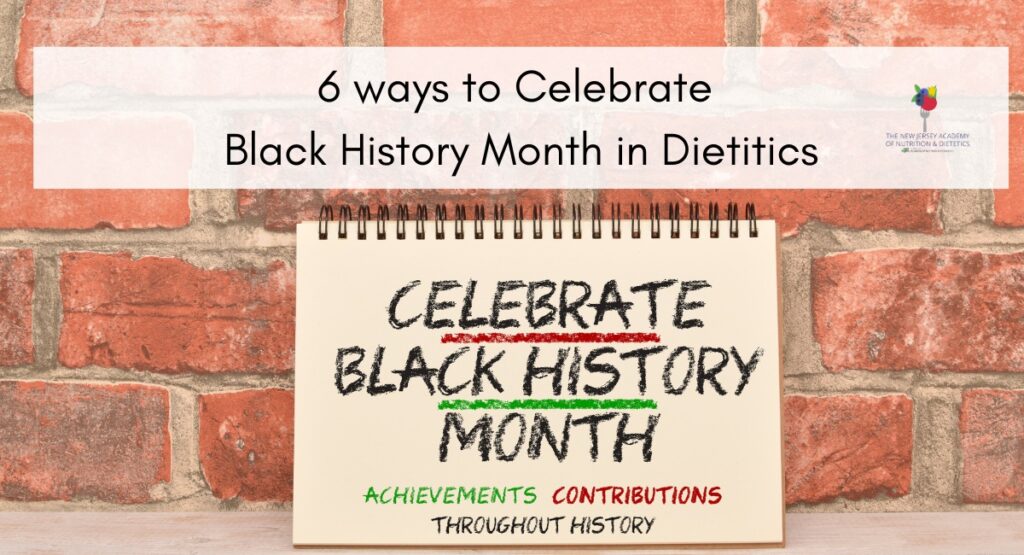February is Black History Month, established in 1926 by Black historian Carter G. Woodson to celebrate the achievements of African Americans and recognize their central role in U.S. history. In addition to learning about Black registered dietitian nutritionists’ contributions to the nutrition and dietetics profession — such as Joncier Greene, MS, RD; Solona C. McDonald, RD; Lenora Moragne, PhD, MS, RD; and Sarah Wilder, PhD, RD.

Here are six ways we all can celebrate Black History Month.
- Read Black Authors. There is a plethora of books and resources available — including non-fiction, fiction, cookbooks, children’s literature and poetry — that offer a wealth of information and insight into the Black experience. Most local libraries are celebrating Black History Month with curated collections of titles for all ages and reading levels. Online and brick and mortar bookstores also are excellent resources, with suggested book club selections and online reviews and ratings available.
- Follow Black Content Creators. If you’re on social media, whether it be Instagram, Facebook, Twitter, LinkedIn, YouTube, Snapchat or TikTok, now is a great time to follow Black content creators. You can start with professional historians associated with museums, libraries and universities for credible historical references; Black registered dietitian nutritionists and health professionals for nutrition information or recipes; or everyday creators sharing their experiences and stories. Once you follow a few Black creators, most platform algorithms will start suggesting other similar creators.
- Look for Black History Collections on Streaming Video Platforms. The biggest streaming video platforms — as well as free video collections online — are promoting collections to celebrate Black History Month, including documentaries, biographies and biopics, and dramas, satire and comedies sharing Black experiences and starring or directed by Black artists.
- Learn about the role of Black Americans in the Arts. The 2024 Black History Month theme is “African Americans and the Arts.” According to the Association for the Study of African American Life and History, this theme celebrates the history of Black Americans in “visual and performing arts, literature, fashion, folklore, language, film, music, architecture, culinary and other forms of cultural expression.”
- Support Black Health and Wellness and Advocate for Health Equity. Black Americans experience higher rates of many illnesses, such as diabetes and hypertension, plus higher rates of death from these illnesses. There also is a disproportionate amount of maternal and infant mortality among Black Americans. In the U.S., access to health care for Black people is often subpar due to several social determinants of health, such as a lack of safe transportation. Support Black health and wellness and health equity through volunteerism and advocacy. The Academy’s vision is a world where all people thrive through the transformative power of food and nutrition. As such, we support legislation designed to eliminate racial and ethnic health disparities and chronic disease. So can you.
- See a Registered Dietitian Nutritionist. Whether you are seeking an expert consultation to support your personal or family health, help manage a disease or condition, improve physical performance in athletics, or any other nutrition and wellness goal, use Find a Nutrition Expert to locate an RDN offering in-person or telehealth services in your area.
If you’re a Black Registered Dietitian and a member of the Academy of Nutrition and Dietetics be sure to check out the members of interest group. member of American BE sure to check out National Organization of Blacks in Dietetics and Nutrition (NOBIDAN) for more black health and wellness.
Contributors: Sue-Ellen Anderson-Haynes, MS, RDN, CDCES, LDN, CPT
Reviewers: Academy Nutrition Information Services Team
Adapted for NJAND: Marissa Perrotta RDN, RYT



